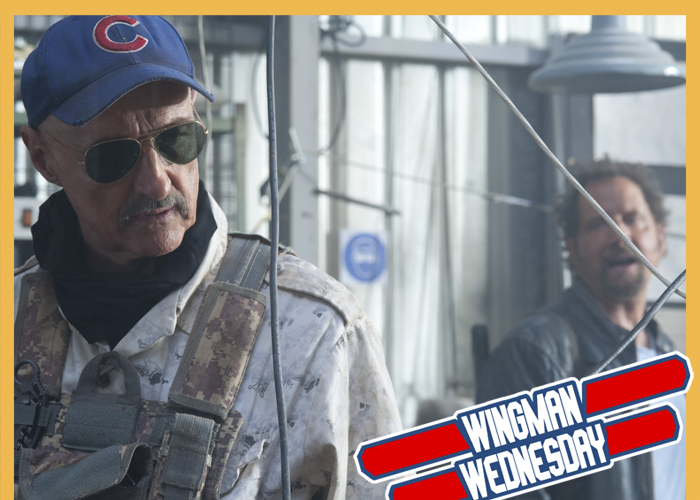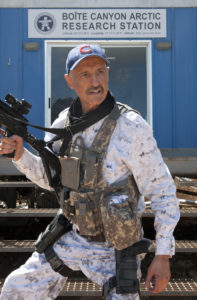
It would be a GROSS understatement to suggest that Michael Gross expected he’d be talking about the “Tremors” franchise nearly 30 years after he first slipped into the paranoid skin of Burt Gummer. Not an immediate hit by any means, the horror/comedy mashup about a race of underground worm-like killers was a slow burn, finding an audience in the aftermarket where it lived on in VHS, DVD, and eventually, the digital domain. Now, with the release of the sixth installment, “Tremors: A Cold Day in Hell,” the veteran actor is once again hunting the relentless movie monsters, and enjoying the character’s personal journey along the way.
We recently sat down with Gross to discuss his favorite Burt story arcs, why he prefers not being John Wayne, and how we could all take a lesson from the Keaton family in these politically-divided times.
TrunkSpace: We would imagine that your “Tremors” journey has been a bit of a pleasant surprise, because when the first film came together back in 1990, it probably didn’t scream franchise right out of the gates, correct?
Gross: No. In fact, it didn’t even scream future at all, because the original film was not all that widely accepted in its first theatrical release. It was out for less than two weeks. It did not have a huge opening weekend. It caught on a little bit, but really wasn’t around very long. I had very few chances to see it in a major motion picture theater. I think I saw it twice. And it was only in the aftermarket venues, in those days, the prehistoric VHS copies, where it began to catch on and became this dirty little, private secret to a lot of otherwise normal human beings that this thing was out here. And, so, that’s when it caught on, in the aftermarket.
So, I never thought there would be a second one. Like most actors, I’m usually paranoid about never working again, and you just think of it as a one-off – a great one-off – and what fun it was, but the response was somewhat tepid, you know?
TrunkSpace: Do think the way that the industry has changed in terms of the distribution model has enabled it to go further than what anyone imagined?
Gross: Well, yes, that’s certainly a part of it. The industry in general has become so compartmentalized. When I first began television in 1982, there were three networks. Three, that’s all. There was no cable. It was totally bizarre. And there wasn’t even a Fox Television in the first year of “Family Ties” in 1982. There was NBC, CBS and ABC – that was it. And, so, now you can literally pick the channel, the world, the kind of news reports you want. You want to listen to Fox News? Fine. You want to listen to Al Jazeera? Go ahead. BBC? Have your choice. And I think it’s the same way in the video market, they can distribute things piecemeal to people in different ways and say, “Well, here’s something for you, here’s something for the rest of you, here’s this, here’s that,” and send them out. The technical changes have made all this possible.
TrunkSpace: A long-term character journey like you’ve experienced with Burt is usually something you see in television. Is it a bit of a different experience with something like “Tremors” where you’re stopping and picking back up again with long breaks in-between?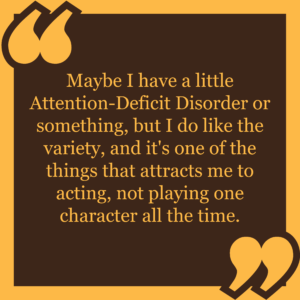
Gross: Yes. I actually like the stopping and going. Before I really entered television and film I did a lot of stage work, repertory theater work, where I was more… on “Family Ties” I played one character for seven years, and I used to tell people I felt more accustomed to playing seven characters in one year than I did playing one character for seven years. So, I love the variety. I don’t know if I could take a steady diet of Burt. That is, day in and day out, going to the set every day and being Burt. I mean, it’s fun, but I don’t know. Maybe I have a little Attention-Deficit Disorder or something, but I do like the variety, and it’s one of the things that attracts me to acting, not playing one character all the time.
For example, I don’t know that I would have cared to, I don’t know, been John Wayne, for example. You saw great films, and he was an iconic character, but the characters you saw were the further adventures of John Wayne, with a different character, maybe a different costume on. I always loved the variety… more of the Dustin Hoffman and the Daniel Day-Lewis type of people who like to submerge themselves into a role rather than have the role completely reflect them. A perfect example, in a couple weeks I’m going to do another episode of “Grace and Frankie” for Netflix, in which I play a gay man.
TrunkSpace: Which in the grand scheme of things, must be the dream… having the opportunity to slip into as many different skins as possible?
Gross: Well, yes, and I never thought of myself as a leading man. I’ve been a character actor. I was never the young leading man, I was always a guy who was somebody’s buddy, or somewhere in the background, but transforming himself into different people. So, when people ask me what’s it like to be the star of “Tremors,” I say, “I don’t consider myself a star as much as I am part of an ensemble.” I’ve always felt part of an ensemble, and that’s the secret to longevity, to me.
TrunkSpace: And we would imagine that variety also pertains to the “Tremors” franchise because each film has it’s own feel tonally. Yes, they’re part of the same universe, but they aren’t all cut from the same cloth.
Gross: You’re absolutely right. That’s one of the reason’s I’ve had a part, not the ultimate part – I’m not the ultimate decision maker – but I have had some sort of voice in the character of Burt and what he faces in some of these things. In the early “Tremors” movies, it was about Burt’s expertise as a monster hunter. You didn’t learn terribly, terribly much about him as an individual, or what his challenges are, personally. Between 1 and 2 he lost his wife, but in 3 he never spoke about that again. And in “Tremors 5” we wanted to explore the possibility of what’s it like for a man who’s a complete loner, almost misanthropic, to have to deal with someone who comes from out of nowhere who says, “Oh, by the way, I’m your blood relative, I’m your child, and I want to get to know you.” Well, nothing could be more challenging for the misanthrope than to have another human being in his life. And, so, I wanted to be in this struggle with his personal life as well as his professional life. And in “Tremors 6,” to me it’s about, without giving away all the details, it’s about a man having to give up some control. A man who always, always wants to be in control. Not only be in control, but wants to micromanage a situation. Does he deal gracefully, or ungracefully? Dragged kicking and screaming, or easily, into giving up control?
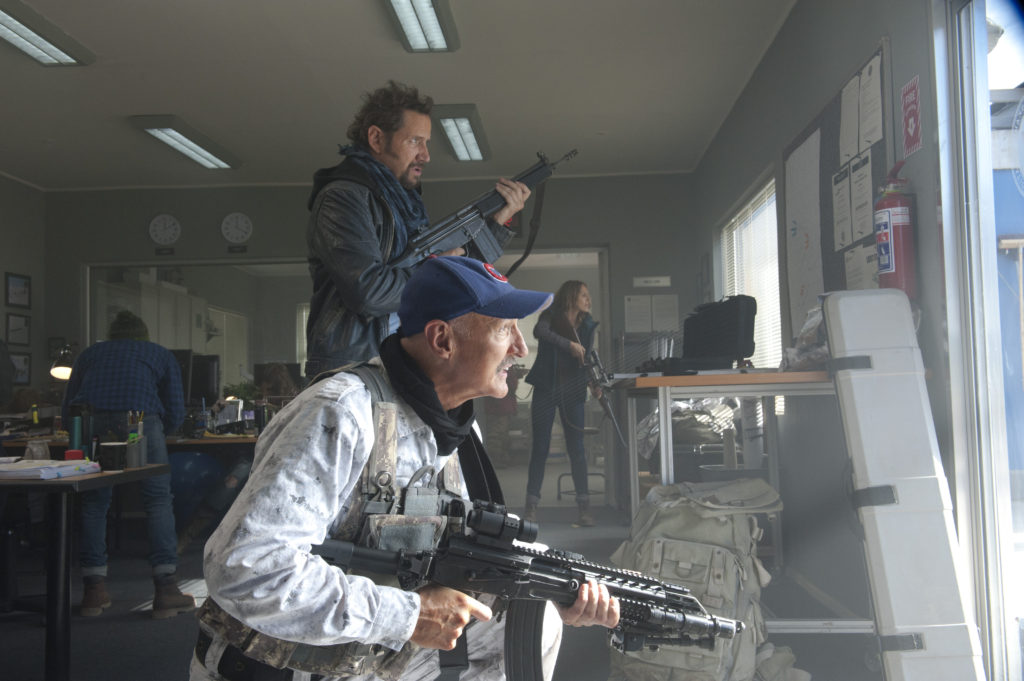
TrunkSpace: He has to learn how not to be in the driver’s seat, in a way.
Gross: How not to be in the driver’s seat! And, so, just as an actor, to me it’s always interesting in the journey a character takes in a piece, and for me that was part of his journey, which made it interesting. And should we do a “Tremors 7″… we’re already talking about ideas. Now, that could be pie in the sky, it may never happen, but we’ve already discussed where would Burt go next? What would be the next challenge for him, professionally, with monsters, but personally, with his own monsters, if you will.
TrunkSpace: Well, and at the end of the day, we would imagine that as far as a performance standpoint is concerned, that’s the most interesting part, the personal stuff he’s dealing with?
Gross: Exactly. I’ve always loved them. I’ve loved every one of them, but for me, personally, as an actor, one of the most interesting, just in terms of the journey a character takes from one place to the other, was “Tremors 4,” a man who came in from the East Coast who looked down his nose at these hardscrabble people in the middle of nowhere, who didn’t wash, who had no civilization, there was no opera house, there was no poetry to their lives, they were just… it was a subsistence existence. He disliked everything about the place, and everything about the people. And in the course of the piece he learned to love them, love the place, and think of it as someplace worth defending. That journey was the most fascinating journey I took as an actor in the first four films, just because of the changes that took place in Hiram Gummer, in the space of, you know, under two hours. And that’s always part of the fun for me.
TrunkSpace: You had mentioned that you started your television journey in 1982. If you could sit down with that version of yourself from almost 40 years ago, what would he say about how your career has played out? What would he think?
Gross: Well, I would say I’m sorry I haven’t had more of a feature film career. In some senses, I look back on “Tremors 1” and it could have been my breakout role had it been marketed a little better – had more people seen it – because, to me, it was so vastly different from what I had done for seven years on “Family Ties.” I have some regret that there’s not more of a feature film career. Not because feature films are inherently better, but a lot of people see them, and it gives you a certain cache in the business that you don’t otherwise have. It’s not that we aren’t all respected as actors, and I love having, I think, the respect of others in the business and the craft, but the most exciting thing for the actor is seeing the best material and getting a hold of a good piece of material before somebody else sees it. Those A-list people get to see the good material first, that’s all. It’s not about praise, it’s not about fortune, it’s about looking at the good scripts early, you know, before they’ve gone through other peoples’ hands. And, so, that’s why, to me, a feature film career is exciting, because you have access to material that other people don’t. That’s why I was so long a part of the stage, and still enjoy going to the stage from time to time, is it’s always chasing the good material. And that’s one of the reasons I keep coming back to Burt, because the comic genius of this character alone is worth the journey – the comic paranoia, the obsessive compulsive disorder, the utter imbalance of the man is such a pleasure to play. It can be mined for such comic treasure.
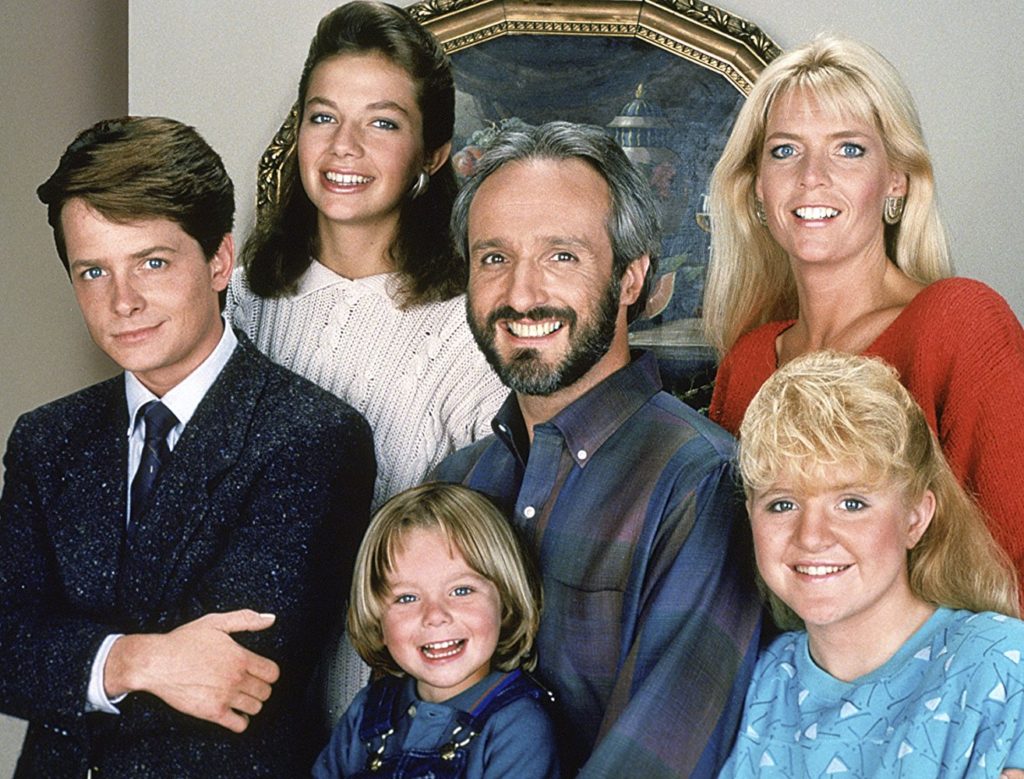
TrunkSpace: Finally, Michael, we live in such politically and socially divided times. What do you think a Keaton family Thanksgiving would look like in 2018, because they themselves had different POVs, and yet it never made the family fracture?
Gross: You know what I think? There’s a part of me that wants nothing to do with rebooting that show, absolutely nothing, because it was such fun when we did it, and it would be hard to recapture that wonderful spirit. But one of the reasons I would love to see the Keatons together again is, as divided as they were politically, they always settled things amicably. Ronald Reagan… it was his favorite television show, and he came very close to actually becoming a guest on it, but it was rejected for various reasons – security and scheduling, and it was a bit gimmicky, but it came close. There were talks about his making a cameo appearance on this thing. But those were the days, even in the days of the Reagan years, when Reagan, who had very different ideas from Tip O’Neill, from Massachusetts, two Irishmen could sit down over a bottle of whiskey, and hammer out their differences, and come up with something. Government works with compromise just the way good marriages, or good families work, with compromise. And, so, the Keatons were always able to have kids who didn’t believe what they did, yet were not sent up to their bedrooms without dinner, or dessert, because they happened to disagree with their parents. There were ways of working it out, and love conquered all. And, so, I think that would be a great dose of things to have again in this period of time, had it been rebooted.
“Tremors: A Cold Day in Hell” arrives today on Blu-ray combo pack, DVD, Digital, and On Demand.
“Tremors: The Complete Collection” is also available today on DVD.


